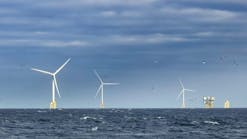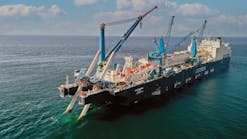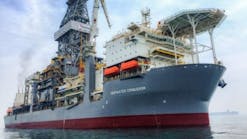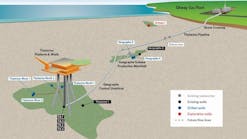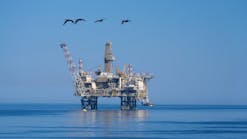The BP-Amoco merger has changed the overall equity holdings for all stakeholders in deepwater Nigeria. Between them, the two companies had equity in eight out of the 20 leases, totaling a net 1.3 million acres. Amoco pulled out as a result of the merger, dumping 775,882 acres in four leases.
On its part, BP started pulling out before the merger was finalized, but the British company speeded things up after the merger. The BP/Statoil alliance, which operated three leases and had technical partnership in one, collapsed in February, when BP decided to leave as a result of lack of substantial discoveries in all the leases. Statoil later made the huge discovery Nnwa in one of the leases.
The relinquishment opened the way for other companies to have a look in the leases and led to substantial changes in the ownership profiles. Statoil pulled out after BP in OPL 213, leaving Texaco with a 100% operatorship. The company is currently looking for a farm-in partner.
In OPL 217, Texaco's stake has moved up to 46.15% compared to Statoil's 53.855%. (BP and Statoil used to hold 35% each, to Texaco's 30%). Meanwhile, both BP and Statoil relinquished their combined 40% in Allied Energy's OPL 210, leaving the cash-strapped, indigenous operator holding 97.5%.
Amoco's decision to pull out of its 50% partnership with Mobil in OPL 221 left the operator reeling at first, then deciding to let go, after three unsuccessful wells. Now, the lease is open. In OPL 209, in which the operator Exxon held 45%, Amoco's exit suggested an opening to other companies.
One of those who tried to come in was the California based giant, Chevron. But, Exxon and Shell decided to exercise their rights, and thereby increased their stakes according to their standing proportion. The equity holdings stand at Exxon - 56.25% and Shell - 43.75%. The move by these two companies confirmed the prospectivity of the block. Exxon announced a significant discovery, Erha-1, earlier in the year, with a possible 500 million bbl of oil in reserves. This makes it difficult to understand why Amoco pulled out.
Operators prepare for Nigerian bidding round
The revocation of 15 recently awarded leases in Nigeria's deepwater has spurred multinationals and indigenous companies alike to get prepared for an eventual bidding process. The revocation notice, announced on July 6, came on the advice of the review panel, which was set last month, to review all contracts, licenses, awards and approvals made by the former military government between January and May 1999.
The revocation was made ahead of the development of a new procedure for bidding and allocation of licenses and acreage by the new government. At the last count, 47 leases are available in the ultra-deepwater area, offshore Niger Delta and Benin Basin. Some of the leases are in disputed territories, with Sao Tome to the south and Equatorial Guinea in the east.
Operators are now expressing interest in purchasing non-exclusive 2D seismic survey data from Veritas, covering 31 open blocks, as well as non-exclusive 3D seismic survey data covering 6,700 sq km in four blocks (OPLs 244, 248, 249 and 250). Operators seem to favor a long bidding process (at least 6-9 months), in order to purchase and evaluate the huge volume of non-proprietary data available for all the open leases. Nigeria's only bid round, which was held in 1992, took only one month to complete, after a long period of advertisement.
Gabon: Marathon lets go of Akoumba Marin
After three years of searching for someone to farm-in, Marathon has relinquished the 637,034-acre Akoumba Marin lease in Gabon's deepwater Coastal Basin. Akoumba Marin (formerly L-93) is located in 200-2,000 meter water depths southwest of Port Gentil. Marathon acquired the lease in June 1996. By November of the same year, the firm had acquired 1,994 km of 2D data as well as 550 sq km of 3D data.
Marathon has relinquished the Akouba Marin in the deepwater of Gabon.
In February, Marathon plugged and abandoned the Affanga Marin-1 well on the lease and was hoping to drill a mapped prospect located in 670 meters water depth.
But, the 40% farm-out that the company was seeking did not come to fruition. The relinquishment of Akoumba Marin has further cast a shadow on the prospectivity of the deepwater Gabon, where open bidding rounds were recently rendered inconclusive by operator apathy.
New deal offshore Liberia
Fusion Oil and Gas has signed a joint venture agreement with Daytona Energy covering Daytona's Block A offshore Liberia. Block A was awarded to Daytona in February as part of a study agreement with the Liberian government which required the company to complete a geologic study of the block and allows it the exclusive right to enter into a petroleum agreement with the government.
Under the terms of the joint venture with Fusion, the firm will conduct a full technical evaluation of the block and earn a 30% interest. Fusion will also operate the joint venture and will have the exclusive right to conduct negotiations with third parties. If Fusion is successful in securing funding for a seismic program, it will earn an additional 30%.
PGS carpets West Africa
PGS Exploration's Ramform Explorer seismic vessel has returned to Nigeria from Brazil to complete a planned 5,200 sq km non-exclusive 3D survey over OPL 248, 249, and 250 in the Nigeria's ultra-deepwater.
The vessel has already acquired some 4,700 sq km of the data for the survey (90% of contract). The Nigerian survey is the largest of the three such non-proprietary 3D surveys that PGS is running across much of West Africa's prospective acreage. The data is meant to provide information to companies interested in bidding for acreage in the area. The vessel is currently acquiring a 8.5-km-wide strip on the eastern-most edge of OPL 249 and 250. The processing of the full data set will be completed by the end of October.
Ahead of Togo's Bid Rounds, due by November 1, PGS's other seismic vessel, the Ramform Valiant, has acquired 3,100 sq km of 3D data offshore Togo. PGS fingers a large anticlinal structure in the deepwater part of the Lome basin believed to be associated with the Romanche Fracture Zone.
The structure crosses the whole of offshore Togo before it plunges into Benin to the east and Ghana to the west. But the project has been a little behind schedule. Instead of the proposed first quarter, the data processing was actually completed and made available at the end of May 1999.
PGS has also acquired 1,800 sq km of 3D seismic in Benin's Block 4, 650 sq km of which has already been fast-track processed. The entire 1,800 sq km survey was ready for potential buyers around early June.
